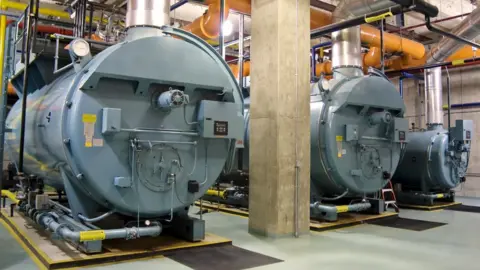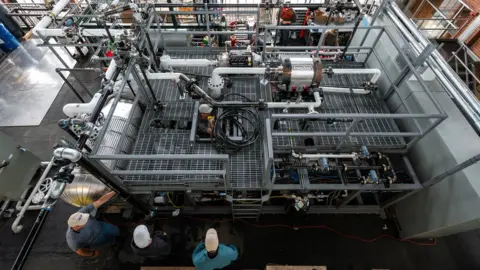Written by Michael Winrow, Technology of Business reporter, and sourced from Why green steam is a hot issue for business (bbc.com)
Colorado-based New Belgium Brewing can trace its roots to 1988 and a cycle trip through Belgium.
The experience inspired co-founders Kim Jordan and Jeff Lebesch to bring Belgian brewing techniques back to their home town.
Three years later and the duo were selling Fat Tire, one of their first beers at a local festival, and they now have over a dozen beers in production.
But while they have spent 30 years creating flavours unique to the US market, they have at least one thing in common with all brewers – the use of steam.
Steam is used to sanitise their brewing equipment, as well as being a key part of the brewing process.
Large cone-shaped kettles are used to boil wort – liquid extracted from the initial brewing stage of mashing barley – generating steam.
This boiling process helps to remove flavours the brewer does not want in the beer, before the wort is transferred to vessels to ferment with yeast, resulting in beer.
Some of the steam generated by the kettles is captured by a heat exchanger, which allows the brewer to use this waste heat in the next batch of brewing.

The driving force behind the industrial revolution, steam remains crucial to production processes across multiple industries.
As well as its frequent use in the food and beverage industry, steam is also used for sterilisation by pharmaceutical companies, and for heating a wide range of buildings such as hospitals.
But steam is still primarily generated using boilers run on fossil fuels, giving it a big carbon footprint.
Fossil fuels made up 73% of industrial energy use in the US in 2018, with 40% of these fossil fuels used to heat boilers producing steam.
To cut that, one option would be to switch to electric. Assuming the electricity is generated from sustainable sources, then the carbon footprint is slashed.
But using electricity does have downsides.
“The biggest challenge is cost, which is likely to limit the pace of customer adoption,” says Maurizio Preziosa, from UK-based engineering firm Spirax Group.
While cost might be an issue, the switch is relatively straightforward.
Mr Preziosa says that his firm’s technology can usually slot into the existing system.
“Customers can continue to use the rest of their existing steam infrastructure,” Mr Preziosa explains.
This has the additional benefit of reducing downtime, a potential obstacle to adoption for companies reliant on tightly calibrated production processes.

US-based AtmosZero has a different approach to creating steam. Their boiler is a heat pump, which extracts heat from the air and turns it into high temperature steam.
It works by circulating liquid refrigerants with low boiling points through a closed loop, capturing warmth from the air.
The slightly warmed refrigerant is compressed, raising it to a temperature high enough to boil water.
A heat exchanger then transfers that heat from the refrigerant, to water to make steam.
The big advantage of this approach is that it cuts operating costs.
The company’s chief executive, Addison Stark estimates that their heat pump technology could save companies hundreds of thousands of dollars compared to the options currently available.
“Being a heat pump-based system, we are significantly more efficient than current boilers – we create about two units of heat output for one unit of energy input, dramatically reducing the operating costs,” Mr Stark explains.
Associated Steam, Air and Hot Water is the Mid-Atlantic’s premier Manufacturer’s Representative for all your Heat Exchange and Fluid Specialties requirements including Airside, Filtration, Flow Measurement, Hot Water, Valve and Steam products. Associated provides total solutions in steam and condensate, heat transfer, hot water and humidification in Delaware, Maryland, New Jersey, Pennsylvania, northern Virginia and northern West Virginia. Associated Steam is a member of eMMA and NJStart, and is a proud to offer products under the Pennsylvania COSTARS-8 contract.
